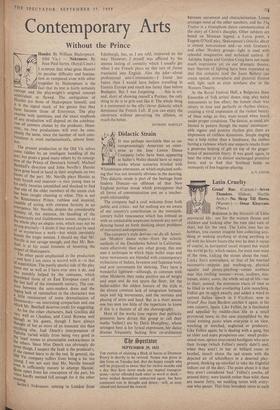Contemporary Arts
Without the Prince
Hamlet. By William Shakespeare.
(Old Vic.) — Nekrassov. By
Jean-Paul Sartre. (Royal Court.) I SUPPOSE that what 'gives Hamlet its peculiar difficulty and fascina- tion as compared even with other tragedies by Shakespeare is the fact that its text is fairly certainly corrupt and the playwright's original concept ambivalent or flawed. The ambiguities of Hamlet are those of Shakespeare himself, and t is the signal mark of his genius that they have become those of Everyman. The play swarms with questions, and the exact emphasis of any production will depend on the combina- tion of answers chosen by the producer. More- over, no two productions will ever be com- pletely the same, since the number of such com-
binations is, even mathematically, almost limit- less.
The present production at the Old Vic solves some riddles by an intelligent handling of the text, but poses a good many others by its concep- tion of the Prince of Denmark himself. Michael Benthall's direction and John Neville's Hamlet have gone hand in hand in their emphasis on two facets of the part. Mr. Neville plays Hamlet as both boyish and insecure—a nice young man in his early twenties astonished and shocked to find that one of the older members of the tennis club has been caught cheating at whist. This is not the Renaissance Prince, ruthless and inspired, capable of acting with extreme ferocity in an emergency. Mr. Neville, despite the considerable subtlety of, for instance, his handling of the kosencrantz and Guildenstorn scenes, imparts to the whole play an elegiac note, which may not be Wrong precisely—I doubt if that word can be used of so mysterious a work—but which inevitably lessens the tragic tension. I should say that Mr. Neville is not savage enough, and that Mr. Ben- thall is at his usual business of lessening the imPact of Shakespeare. The other point emphasised in the production "'and here I am more in accord with it—is that of superstition. The purely spooky side of the play came out as well as I have ever seen it do, and Was possibly helped by the costumes, which resembled those of an East European court of the last half of the nineteenth century. The con- trast between the semi-modern dress and the raging lack of rationalism in the characters was a little reminiscent of some dramatisation of Dostoievsky—an interesting comparison and one Which Mr. Benthall deserves credit for suggesting. As for, the other characters, Jack Gwillim did very well as. Claudius, and Coral Browne well eknough as his queen, though I have always thought of her as more of an innocent slut than anything else. Judi Dench's interpretation of
the varied wildly from being very good in
She 'mad' scenes to abominable awkwardness in ishe others. Since Miss Dench can obviously do ..otne things, I suspect the fault is the producer's, 1.,t _she cannot learn to do the rest. In general, the Old Vic company suffers from being a bit too elreiling. I am not sure that Mr. Neville himself Quite is sufficiently mature to attempt Hamlet. N?u.ite apart from his conception of the part, his owe hardly seemed full enough for it the other evening. Sartre's Nekrassov, coming to London froM
Edinburgh, has, so 1 am told, improved on the way. However, I myself was afflicted by the intense feeling of unreality which I usually get when I see French plays on this sort of theme translated into. English. Also the joke—about professional anti-Communists—I found less funny than I would have before travelling in Eastern Europe and much less funny than before Budapest. But I was forgetting . . . this is art, and, short of showing oneself a Puritan, the only thing to do is to grin and like it. The whole thing is a monument to the silly /clever dialectic which dominates the French Left. If you can enjoy the cleverness without perceiving the silliness, so much the better.
ANTHONY HARTLEY
































 Previous page
Previous page